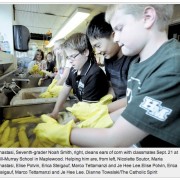
On the last school day of homecoming week at Hill-Murray School in Maplewood, local farmers Brian and Leslie Axdahl came to the cafeteria to display a rainbow bounty of peppers, squash, tomatoes and corn. They walked around lunch tables and greeted students, who were gearing up for a pep rally later that day.
Every Monday, Nancy Lynch, cafeteria director from Taher, Inc., the company that provides Hill-Murray’s food, picks up 75 to 100 pounds of fresh produce from the Axdahls’ farm in Stillwater.
Earlier in the week, a small mob of middle school students got to shuck about 300 ears of corn – the last of the Axdahls’ harvest. The same group returned Friday to greet the Axdahls at their display.
It’s all part of a statewide “Farm to School” program connecting participating schools to local farmers. The program – which improves access to fresh, local foods for schools and opens new markets for area farmers – is sponsored by the Institute for Agriculture and Trade Policy.
Eating food from farmers down the road also fits with Hill-Murray’s mission as a Catholic Benedictine institution that is committed to simplicity and frugality, said school spokeswoman Sheri Lunn.
“It’s provided not only a connection with the earth and the people who grow [the food], but also really reinforced our focus on community,” Lunn said.
Student council co-president Taylor Mills said Hill-Murray has done a good job of encouraging students to eat healthy. Last school year, she said, the cafeteria’s once-a-week food bar, which served all-you-can-eat fruits and vegetables for 50 cents, was extremely popular.
A learning experience
The program works with about 120 public school districts, but Catholic schools like St. Hubert in Chanhassen, St. Therese in Deephaven and Holy Family High School in Victoria also have contacted the institute to request Farm to School packets to use with their healthy eating programs, said Emily Barker, an IATP program assistant.
Lynch, who lives in Scandia, said she already was passing by the Axdahls’ farm twice daily going to and from school, so the pick-up was a short detour. She said small farmers struggle delivering to multiple sites.
The program has been a learning experience for Lynch. She has had to become more aware of what is in season. Necessary communication between Lynch and the Axdahls has forged a close partnership. For example, Lynch had never been concerned about frost before, but when a cold spell hit Minnesota three weeks earlier than expected, she immediately thought of the Axdahls, she said.
Junior Joe McGrath, who was in the cafeteria for study hall during the Axdahls’ visit, immediately went up to their table and began swapping hot pepper stories with them.
McGrath’s family members grow many varieties of pepper – tomatillo, Caribbean red, habanero – in their garden, and he was wondering if they could purchase the plants locally from the Axdahls. The answer was yes.
“If it’s locally grown, you can taste the difference between that and mass produced,” said McGrath.
Looking to the future
With their 450-acre farm consisting mostly of sweet corn and green beans, the Axdahls supply many Minnesota wholesalers during the growing season.
The farm was started by Brian’s dad more than 30 years ago and uses a sweet corn harvester developed by Brian himself. The machine can fill 100 large mesh bags in an hour; hand-picking for the same time might yield one bag.
“This is great,” Leslie Axdahl said about the Farm to School program. “If we can get kids to understand – programs like this are the future of small farmers.”
TheCatholicSpirit.com Article Link:




